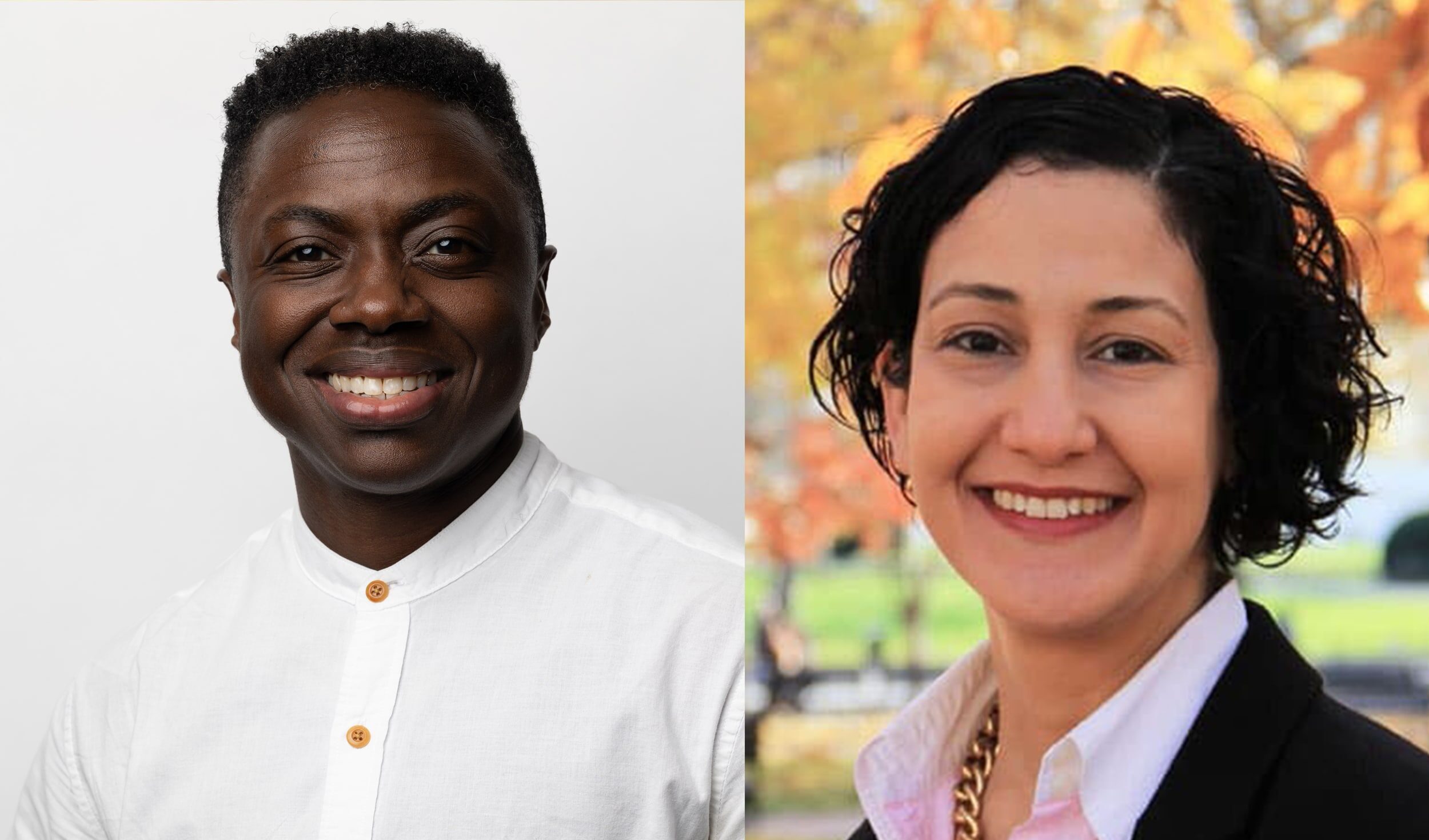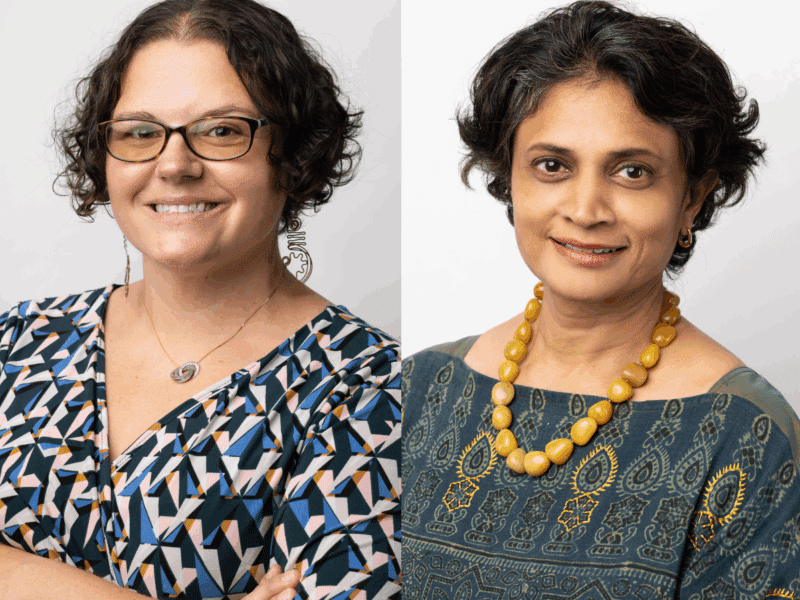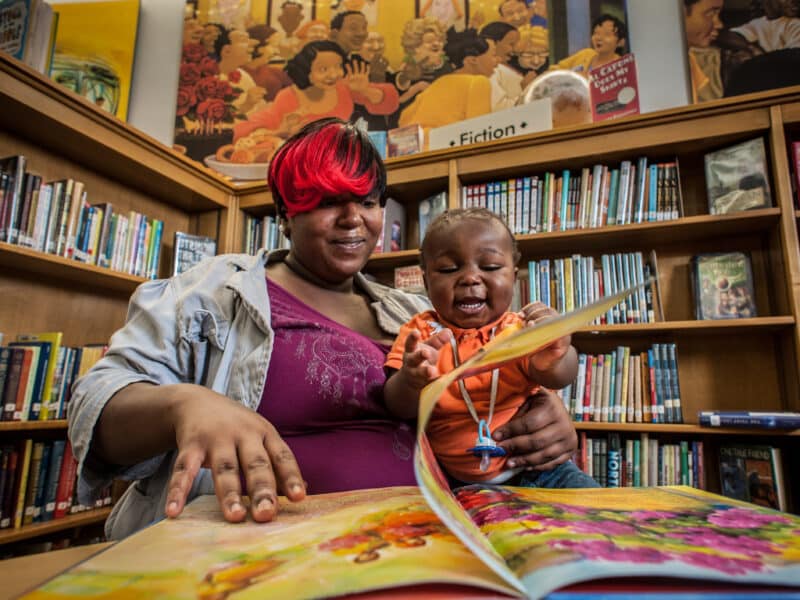The Johns Hopkins Center for Communication Programs is best known for inspiring the adoption of healthy behaviors around the world. But less attention has been paid to its domestic work. For more than a decade, CCP has successfully worked to improve the lives of people in its Baltimore hometown from reducing infant mortality to helping older adults get flu and COVID-19 vaccines. Now, CCP is poised to expand its domestic footprint beyond Baltimore.
CCP’s Stephanie Desmon recently sat down with Debora B. Freitas López, CCP’s executive director, and August Summers, PhD, who leads the center’s domestic initiatives to discuss what CCP has accomplished in Baltimore and how it may be a blueprint for social and behavior change initiatives nationwide.
Stephanie Desmon: Thank you both so much for taking the time. Can you briefly tell me about the types of work CCP has done to this point in Baltimore?
August Summers: In the last 10 years, we’ve done work across the life course. One of the bigger projects has been with B’more for Healthy Babies, which is an effort to address infant mortality in the city. In partnership with the Baltimore City Health Department, Family League of Baltimore and HealthCare Access Maryland, we have successfully brought down the number of infants who die before the age of one. We also have had the opportunity to do a lot of engagement and communication with new parents, caregivers, health care providers in maternal and child health, and more.
CCP also has focused on sexual and reproductive health efforts through the program UChoose. We are making sure that the young adults in Baltimore – and the health care providers and the trusted adults to those young adults – really understand what is available to young people related to their sexual and reproductive health and understanding what their rights are and how to seek services.
We’ve worked with Maryland Department of Health and Behavioral Health System Baltimore on opioid harm reduction efforts. We’ve developed a campaign to increase the use of mediators when conflict between home improvement contractors and homeowners occur. We also have worked with Baltimore’s Division of Aging to help make sure that the aging community had access to food and different services during the COVID-19 pandemic, as well as efforts related to fall prevention.
What I’ve named, that’s just probably only a third of the topics that we’ve worked on across the life course. We work with community members and health care providers, whether that be health educators, doctors, nurses, and others providing direct care or services.
SD: So, the Baltimore story has shown that the CCP model really works in the United States, not just across the globe.
AS: Oh, yes. We have applied everything that we do globally – social and behavior change, capacity strengthening, human-centered design, research and evaluation, and more – to what we do in Baltimore.
SD: Debora, you joined the center in March. And I know that one of the things that you would like to do is expand our domestic work. Why is this one of your key priorities?
Debora B. Freitas López: So much of the work we do in Baltimore could be relevant across the state of Maryland and beyond. For just one example, the Substance Abuse and Mental Health Services Administration (SAMHSA), which is part of the U.S. Department of Health and Human Services, funds programs related to drug use and abuse, mental health issues, and so forth. We think that our experience in risk mitigation and prevention is something that we could do on a state and possible even national level. Same with the maternal child health and child development activities that we do. Those are things that we can certainly translate and demonstrate efficacy beyond Baltimore, where we’ve built a reputation for what we can accomplish, and we’ve built trust.
CCP’s history started from funded work abroad. Even before we were established as a center, we were an international population program. But I don’t think a lot of people know that in the last 10 years we have been doing the same type of work in Baltimore, working with local funders and Johns Hopkins University. Yes, there has been far more behavior change work funded in the international space. But I think there’s a real benefit in doing good in our own country.
SD: CCP has longstanding relationships with USAID, the Bill & Melinda Gates Foundation, and other global donors. Will it be hard to begin building more relationships to do more domestic work? I imagine there’s a whole new learning curve, right?
DBFL: Yes. We are going to seek out more collaborations with U.S. organizations, like the American Public Health Association, whose November conference will feature some of our domestic work. We will be looking at the forecasts put out by the Department of Health and Human Services and looking to work more with the state of Maryland. To do this, we are working to grow our business development team to allow some attention to be shifted back home.
This doesn’t mean we will stop focusing on our work abroad and working with amazing global donors like USAID and the Gates Foundation. We just want to expand to see what else may be out there.
SD: What are your hopes for growing CCP’s domestic work? What do you envision in five or 10 years?
AS: Earlier, Debora, you mentioned that word “trust.” And one of the things that we’re really proud of is the partnerships that we’ve built doing the work we’ve done in Baltimore and Maryland so far. I mean, it carries so much weight to it. And the partnerships that we have, it ends up bringing more opportunities to us. Once we create partnerships, they always come back again to say, “Hey, we are applying for more funding, can you work with us again?”
So, I’m thinking about the process that we’ve taken to build that trust to really have these respectful relationships. How can we follow that same model outside of Baltimore? When I think about the vision, you know, five to 10 years from now, I see the relationships being just as respectful, having that same integrity that we have with the work that we’re doing now.
People we work with see CCP as a “go to” for all the great work that we do in social and behavior change and all the other areas where we work. And so, in five to 10 years, we want people to come to us when something is happening in the United States that needs some level of social and behavior change, research and evaluation, or even knowledge management and sharing related to public health priorities in the U.S. All of these public health priorities are really interconnected and we should be seen as being able to do this work where’s a need and on any topic that needs to be addressed.
DBFL: I do think, August, that the integrity and the mutual respect that we have for our partners and our collaborators is the reason why we have these long-lasting relationships with them. And I think that success and thought leadership comes from those relationships. It’s not just saying, “Yeah, we can do this.” It’s also about the fact that people know that we can do it, because they’ve seen us do it. They know that there’s this mutual understanding that each one of us brings something to the table.
As part of our work abroad, we create best practices, like working with communities and making sure that they are the ones guiding us and that we are hearing them and recognizing their identified needs. And seeing community members as key actors and leaders in the change that we are together aiming to achieve. Those same strategies, we use them domestically – in Baltimore. Though the needs may be different, because every population is different, our passion for working with communities and our drive to make an impact by working alongside key actors are the same – no matter where we are. To be able to do it in our own backyard is special.
AS: One of the things that we really lean into in our process with the U.S. work is moving away from deficit-based approaches, and really leaning into strength-based approaches, being trauma-aware, anti-racist, and leading with empathy. And it really catches the attention of our U.S. partners, because people are navigating difficult life experiences and there are many social justice issues. I think people are eager to explore. What does hope look like? What does joy look like? You know, acknowledge how I’m a good parent every once in a while, please, instead of telling me what I’m doing wrong. Celebrate that I’m doing something OK, because we know so many people want to do the best for their families. And our work can help get more Americans there.





